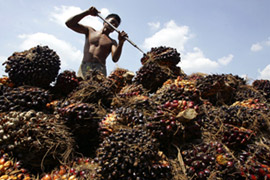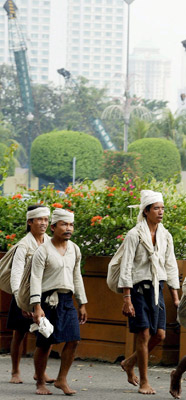Biofuel threat to indigenous people
UN panel says South-East Asia natives among those most at risk of being displaced.

Published On 16 May 2007
Indonesia and Malaysia are among those most at risk because together they produce 80 per cent of the world’s palm oil – one of the crops used to make biofuels.
| Your Views |
| eidolon87, Capaci, Italy Send us your views |
Tauli-Corpuz said that in one Indonesian province, West Kalimantan, the UN had identified five million indigenous people who were likely to be displaced because of the expansion in the production of biofuel crops.
Indigenous people who depend on forests almost entirely for their survival are being forced to migrate to already overcrowded cities, where many of them end up living in slums with limited access to services and poor housing, Ida Nicolaisen, an expert in indigenous cultures and member of the UN forum, said.
She told a news conference on Monday that many countries did not realise how fast the displacement was occurring.
‘High stakes’
“The speed with which this is happening – we don’t really realise in our part of the world. Because the technology we have today and the economic resources that are at stake are so big, it happens overnight.”
Tauli-Corpuz said the forum will discuss the threat posed by biofuel crop expansion during its annual, two-week meeting in New York.
 |
| Indonesia and Malaysia produce 80 per cent of the world’s palm oil [GALLO/GETTY] |
Biofuels, which are made from corn, palm oil, sugarcane and other agricultural products, have been seen by many as a cleaner and cheaper way to meet the world’s soaring energy needs than with greenhouse-gas emitting fossil fuels.
In its first major report on biofuels last week, however, the UN warned that the benefits of the alternative energy source may be offset by serious environmental problems and increased food prices for poor people in the developing world.
Many biofuel crops, the report said, require the best land to grow, diverting resources from food crops and causing prices for staples such as maize and sugar to rise.
Resource-heavy crop
They also demand large amounts of water and environment-damaging chemical fertilisers, the report said.
Tauli-Corpuz said the forum is pushing the UN General Assembly to pass a long-delayed declaration on indigenous rights, which she said would protect native peoples from being driven off their lands as the demand for these biofuel crops grows.
 |
| The UN panel says forcing natives into big cities destroys their culture [EPA] |
The declaration says that governments should respect indigenous people’s rights to traditional lands and resources, and that they have the right to decide on any development project in their community.
The UN Human Rights Council, based in Geneva, approved the declaration in June and recommended that the 192-member General Assembly adopt it.
But the draft did not get adopted due to opposition from African countries who argued it contradicted their national constitutions.
A handful of developed nations with large native populations – New Zealand, Australia and Canada – also opposed the draft.
The US abstained from voting but signed a joint statement with Australia and New Zealand last year calling the draft “fundamentally flawed”.
The three countries said the provisions on lands and resources appeared to recognise indigenous rights to lands now lawfully owned by other citizens.
The African countries have been negotiating on a series of amendments to the draft, but Tauli-Corpuz urged the General Assembly to pass the original declaration during its current session, which ends in September.
Source: News Agencies